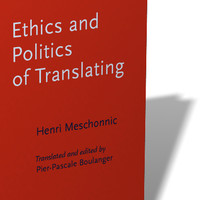DATE
Jeudi 20 octobre 2011
11:45 à 13:00
PRIX
Entrée libre CONTACT
Sylvie Vandaele sylvie.vandaele@umontreal.ca
LIEU
C-9019, 9e étage3150, rue Jean-Brillant
Montréal, QC Canada
H3T 1T3
514 343-6111
Site Web | Itinéraire et carte
CATÉGORIES
GROUPES
Conférences midi du Département de linguistique et de traduction
Département de linguistique et de traduction
Faculté des arts et des sciences
Département de linguistique et de traduction
Faculté des arts et des sciences
RETROUVEZ ÉGALEMENT CET ÉVÉNEMENT SUR
Consulté 35 fois

Conférence de Pier-Pascale Boulanger, Université Concordia
Ceux et celles qui se sont prêtés à la lecture des essais d’Henri Meschonnic en auront sans doute tiré une leçon de persévérance. Et pour cause : les phrases fleuves, la parataxe, les enfilades de virgules et les pronoms aux référents ambigus font tous obstacle à une lecture fluide et facile. J’ai traduit vers l’anglais l’essai Éthique et politique du traduire que Meschonnic a publié en 2007 en me heurtant à la question de la lisibilité et au dilemme qu’elle soulève. Fallait-il traduire Meschonnic contre lui-même en un « anglais correct », c’est dire fluide, et produire un contresens épistémologique de 175 pages? Ou fallait-il rendre sa parole, aussi disruptive soit-elle, au risque d’agacer le lectorat cible et de mettre en péril la réception de la traduction? J’expliquerai la stratégie que j’ai employée en guise de solution à ce casse-tête dans ma traduction Ethics and Politics of Translating (John Benjamins Publishing Co., 2011). Mon exposé portera sur les habitudes de lecture, la fixation sur la fluidité en traduction et les considérations éthiques qui s’imposent lorsqu’on cherche à concilier l’activité du texte et l’activité du lecteur.
http://www.calendrier.umontreal.ca/?com=detail&eID=73862
